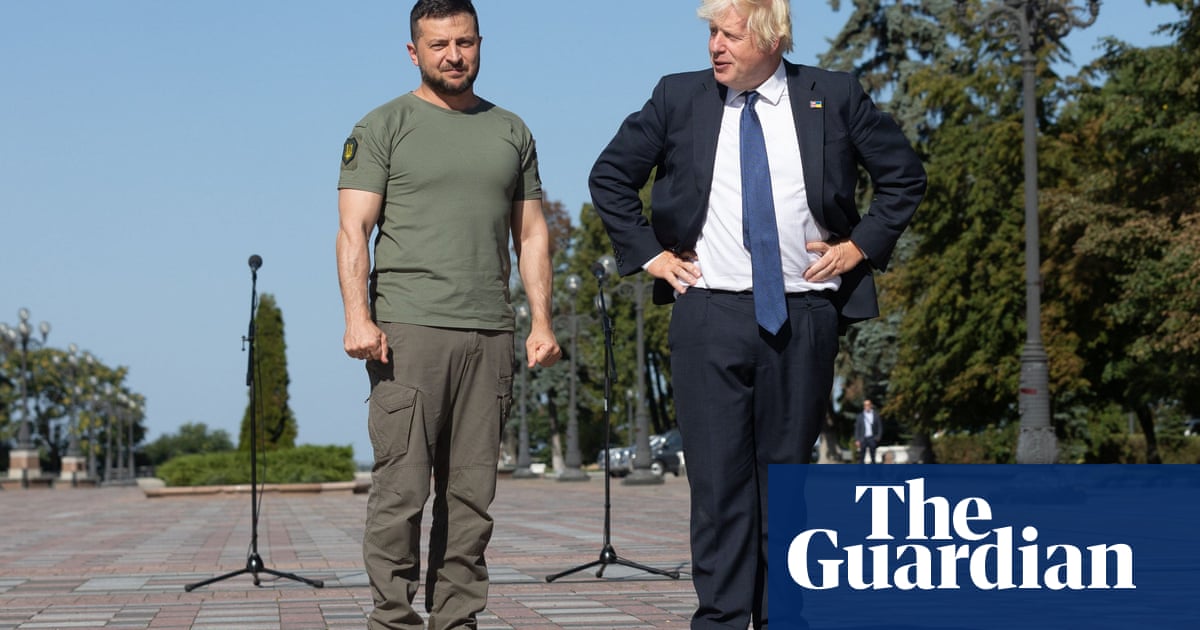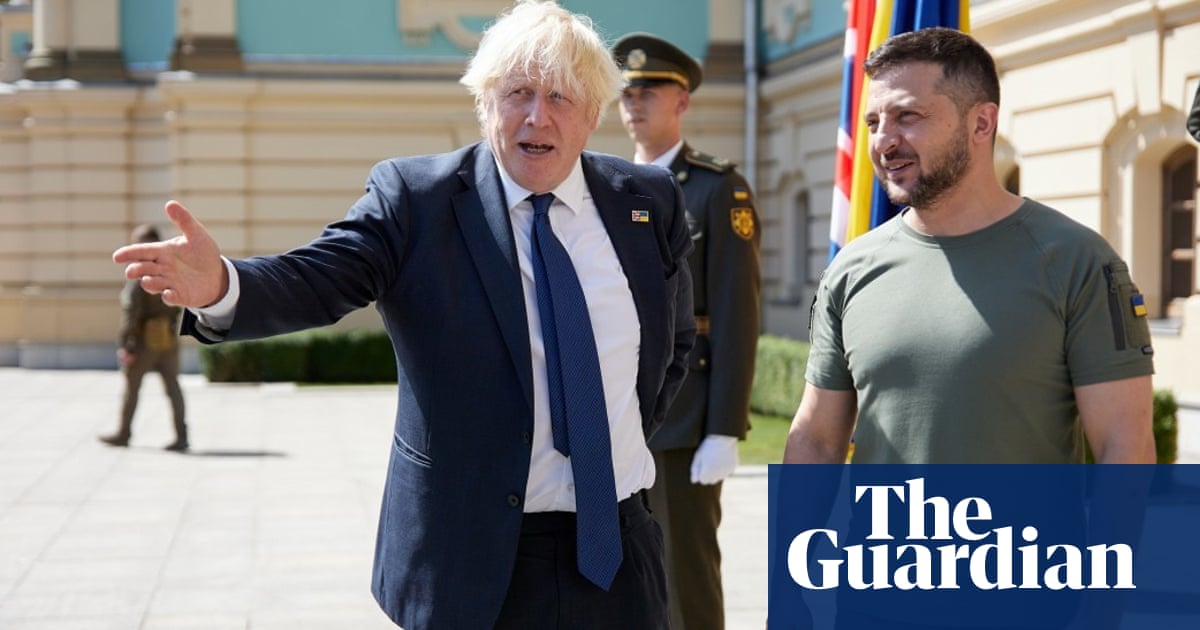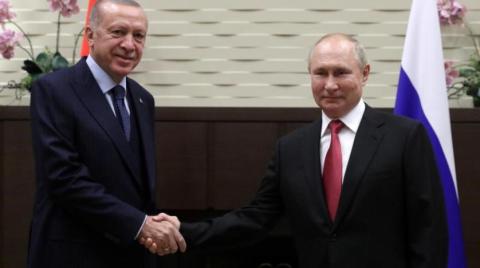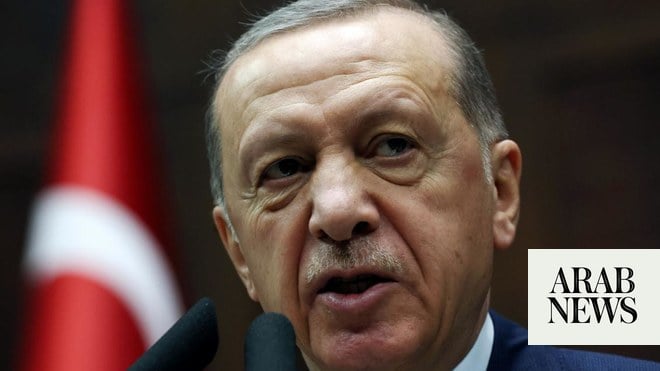
Vladimir Putin has told Boris Johnson that he wants immediate talks to secure clear legal agreements that Nato will not expand eastwards. According to a Kremlin readout of the two leaders’ phone call on Monday, Putin said talks were needed to discuss Nato’s future intentions, and to clarify Ukraine’s plans for the east of the country.
The call marked the first time the two men had spoken since October before the Cop26 climate summit in Glasgow. Johnson expressed the UK’s “deep concern over the buildup of Russian forces on Ukraine’s border”, and warned him “that any destabilising action would be a strategic mistake that would have significant consequences”. The British prime minister also called for the issues to be resolved through diplomatic channels.
The lengthier readout of the call from the Kremlin cited what it described as specific examples of Kyiv’s destructive disruption of the Minsk agreements, the deal that was supposed to settle the Russian-Ukraine dispute.
Putin alleged that the Ukrainian authorities were deliberately exacerbating the situation on the line of contact, as well as using heavy weapons and attack drones prohibited by the Minsk Package of Measures in the conflict zone.
He also claimed Russian-speaking populations were still suffering discrimination inside Ukraine.
Putin said he wanted clear international legal agreements that would exclude any further Nato advance to the east, and the removal of weapons that threaten Russia in neighbouring states, primarily in Ukraine. He added that Russia was preparing clear legal documents to support its demands.
The leaders agreed to continue the discussion of the issues raised through various channels.
It was not clear if the talks represented a material advance on the discussions held recently between Putin and the US president, Joe Biden – which themselves made little headway.
Privately, leaders in the west remain confused about Putin’s intentions, but fear the level of the rhetoric and the increasingly broad demands coming from Russia are setting up the conditions for a serious threat of war – rather than merely testing western determination. It has also been suggested that Putin’s decision to test the resolve and unity of the west may have been prompted by the departure of Angela Merkel as German chancellor.
The growing tensions over Ukraine have come at a time when arms control agreements and strategic stability dialogue between the two countries have been severely corroded. Russia has threatened to deploy intermediate-range nuclear missiles in Europe as a response to what it claims are Nato plans to do the same thing.
The threat, delivered by the deputy foreign minister, Sergei Ryabkov, signals a potential return to the nuclear missile standoff in Europe of the 1980s, when US Pershings were ranged against Russian SS20s.
In that tense period, the world came close to a nuclear war when Moscow came to believe that Nato’s Able Archer exercises in 1983 were a prelude to attack. The missiles were withdrawn after the US and the Soviet Union signed the Intermediate-Range Nuclear Forces (INF) treaty in 1987.
Donald Trump withdrew the US from the INF treaty in 2019 after years of US complaints that Russia was cheating by building and deploying an intermediate-range missile, the 9M729. Russia denied the charge, claiming the range of the missile was legal.
Ryabkov told Russia’s RIA news agency that Moscow would deploy nuclear missiles if Nato refused to engage in talks.
Nato has said it has no plans to bring nuclear missiles back to Europe, but Ryabkov said Russia had a “complete lack of trust” in the alliance, pointing to the reconstitution last month of the US 56th Artillery Command, which operated the missile batteries in Europe until it was stood down in 1991.
“Lack of progress towards a political and diplomatic solution to this problem will lead to our response being of a military and technical military nature,” Ryabkov said. “They don’t permit themselves to do anything that could somehow increase our security – they believe they can act as they need, to their advantage, and we simply have to swallow all this and deal with it. This is not going to continue.”
He claimed that Russia was currently observing a moratorium on intermediate-range nuclear missiles, a claim that Nato disputes. The US alleges that Russia deployed two battalions of 9m729 missiles in 2017, one in the south-west and the other in an unknown location.
Pavel Podvig, a senior research fellow at the UN Institute for Disarmament Research, said he believes Ryabkov’s threat referred to another intermediate-range weapon, the RS-26, which Moscow shelved in 2018.
“I wouldn’t overestimate the importance of the 56th Artillery Command, but if the United States/Nato will go ahead with the deployment of its own missiles, Russia can deploy the RS-26,” Podvig, who runs an independent research project on Russian nuclear forces, added. “And I would note that while US missiles will be conventional, Russia would probably deploy its missiles with nuclear warheads. I don’t know why anyone in Nato believes it’s a good development.”












